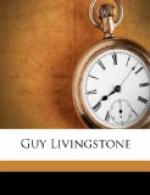“Poor child,” he said to himself, all his angry feelings changing, “she seems to have set her heart so upon winning, it would be sad if she were disappointed. No one has much on it; shall I try ‘Captain Armstrong’ for once? It would make her very happy. Bar accidents, I must win. They do not know that the chestnut has not extended himself yet.”
We lose sight of the horses for a little. When we see them a gain, the mare has decidedly gained ground; and, to our astonishment, the Axeine swerves, and refuses at rather an easy fence.
Miss Bellasys’ cheek flushes this time. She goes off at a sharp canter through a gate that takes her into a field where the horses must pass her close; several of her attendants follow. Charley comes up, looking rather more excited and happy than usual. He has made the pace better for the last half mile, and still seems going at his ease. More than a distance behind is the chestnut, evidently on bad terms with his jockey; he is in a white lather of foam, and changes his leg twice as he approaches. Guy has his face turned slightly aside as he nears the spot where Miss Bellasys waits for him, in the midst of her body-guard. For the first time since the race began, her voice was heard, cutting the air with its clear mocking tones, like the edge of a Damascus sabre, “The chestnut wins—hard held!”
Guy’s kindly impulses vanished instantly before the sarcasm latent in those last two words. He could sacrifice his own victory and the hopes of his backers, but he would not give a chance to Flora’s merciless tongue. We saw him change his hold on the reins, and, with a shake and a fierce thrust of the spurs, he set the Axeine fairly going.
Every man on the ground, including his late owner [who hated himself bitterly at that moment for parting with him], was taken by surprise by the extraordinary speed the horse displayed. He raced up to Bella Donna just before the last fence, at which she hangs ever so little, while he takes it in his swing, covering good nine yards from hoof to hoof. Nothing but hurdles now between them and home. The down-hill run-in favors his vast stride. A thousand voices echo Flora’s words, “The chestnut wins!” Charley made his effort exactly at the right time, and the brave little mare answered gallantly; but it was not to be. He shook his head, and never touched her with whip or spur again.
The race was over. No one disputed the judge’s fiat: “The Axeine by six lengths.”
Up to the skies went the hats and the shouts of the sturdy yeomen, who “know’d he couldn’t be beat,” exulting in the success of their favorite. Round winner and loser crowded their friends, congratulating the one, condoling with the other, praising both for their riding. At that moment I do not think any one except myself remarked Isabel Raymond, who sat somewhat apart, her tears falling fast under her veil as she looked upon her lost ring.




